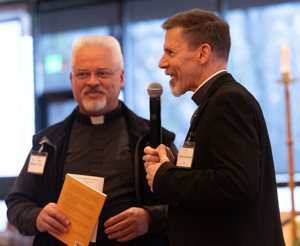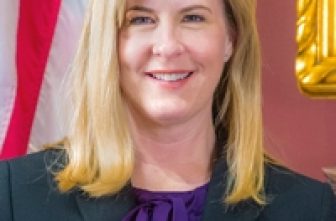
Conversations on the Mass and particularly the Eucharist — in other words, “the preeminent experience of Church” and “the preeminent sacrament of faith,” said Father John Paul Erickson — have been at the forefront of Liturgical Commission meetings.
Pastor of Transfiguration in Oakdale, Father Erickson is also interim chair of the commission, which began meeting during the fall and winter of 2023 and is assisting Archbishop Bernard Hebda as implementation of the archbishop’s pastoral letter — “You Will Be My Witnesses: Gathered and Sent From the Upper Room” — enters its second year in the Archdiocese of St. Paul and Minneapolis.
Year two’s focus “seemed like a perfect fit for the work of this newly devised commission,” Father Erickson said. “We were very honored to be a part of such an important process.”
With a goal of supporting liturgical education among clergy, lay ministers and the faithful, the commission is to consist of 10 to 15 members who are Catholic, all appointed by the archbishop for three-year renewable terms, according to its statutes. Currently, it has 12 members who have personal and professional backgrounds in liturgy, sacred music, liturgical art and environment, and architecture.
“There is a wide variety of expertise represented here,” said Father Tom Margevicius, an ex officio commission member and pastor of four parishes in Le Sueur County whose background includes being a onetime faculty member of The St. Paul Seminary in St. Paul. “The majority of our commission members, in fact, have doctorates in these various fields, so they are well-educated and formed.”
The commission, Father Margevicius said, is meant to be an “an ongoing commission to assist the archbishop in his important task of regulating and promoting the liturgical life of the archdiocese.”
At the time Father Margevicius became director of the archdiocesan Office of Worship about six years ago, the archbishop approached him with an interest in restarting the Liturgical Commission, which had first been established in the archdiocese in 1964, after the Second Vatican Council requested each diocesan bishop to create such a commission. However, COVID-19 struck, and plans to restart were delayed.
“Reconstituting the Liturgical Commission, although it had been in the mind and heart of the archbishop for several years, came to fruition as a direct response to the need to strengthen our plans for (Archdiocesan) Synod implementation,” said Father Margevicius, particularly as the archbishop “realized that one of the most important initiatives to come out of the (Archdiocesan) Synod was strengthening the faithful’s appreciation of the liturgy.”
Set to begin in July, year two of the pastoral letter implementation will adopt two propositions put forth during the Archdiocesan Synod Assembly, held over Pentecost weekend 2022: Proposition 9, to “educate God’s people on the beauty, form and meaning of the Mass, with special emphasis on the Real Presence of Christ in the Eucharist” as well as Proposition 10, to “celebrate prayerful liturgies that inspire the faithful to offer their very selves in the Eucharistic sacrifice of the Mass.”
The archbishop has asked archdiocesan clergy to participate in conversations with him and the Liturgical Commission “about your experiences of, hopes for, and understanding of liturgy,” the archbishop wrote in a year two implementation plan given to clergy, parish staff, Synod Evangelization Team members and others at a “Year 2: The Mass — Implementation Plan Unpacking Day” April 26 at St. John Neumann in Eagan.
“We have wonderful liturgical culture and diversity in so many of our parishes that we want to be able to preserve, but we also want to make sure that it’s always going to be reflective of what it is that the Church is asking from us,” Archbishop Hebda said during the April 26 event.
“How do we maintain that diversity while also celebrating the unity of our faith in that place where the faithful experience the religion of Catholicism in the most direct, concrete ways?” Father Erickson said. “Most people’s experience of the Church is Sunday Mass. How do we make sure that it’s an authentic expression of the faith while also respecting the great diversity? (As a commission), we’ve tried to grapple with that, and I look forward to further conversations about that — it touches upon the heart of what it means to be Church.”
Conversations about pastoral letter implementation, including year two, have been “collaborative right from the beginning,” said Deacon Joseph Michalak, director of the archdiocesan Office of Synod Evangelization. He said recommendations crafted by members of the Liturgical Commission, of which he is an ex officio member, were ultimately woven into the year two implementation plan, including highlighting key archdiocesan liturgies; “Teaching Mass” exercises; and speaker, retreat and seminar opportunities for clergy and the faithful.
Another goal, “very near and dear to the archbishop’s heart, is trying to make sure that our parishes are welcoming,” Father Erickson said. Recommended, therefore, are workshops for liturgical ministers — including cantors, lectors and ushers. For example, “on Sunday, an usher plays an essential role … who can really be a welcoming presence, the presence of Christ.”
Year two of the pastoral letter implementation also builds upon work done so far in year one. The Liturgical Commission encourages small groups to incorporate year two topics into their teaching content — such as the meaning of the Mass, the Eucharist and its effect in the lives of the faithful, and the recovery of Sunday as “The Lord’s Day.”
Father Erickson said he looks forward to conversing with clergy and the faithful about the Mass. He explained how the Eucharist “is such a paragon of the faith because it contains within it the source and summit of our religion, which is faith in Jesus.”
“We are meant to be effective signs of Jesus in the world,” he said. “We become bread for the world and the Blessed Sacrament is given to us to become our food, and we become what we receive.”
Read the year two implementation plan in English or in Spanish.




